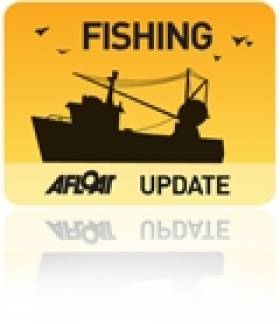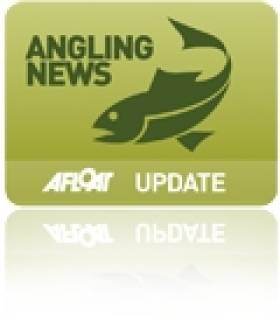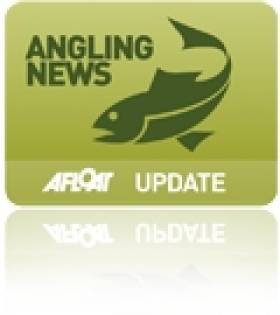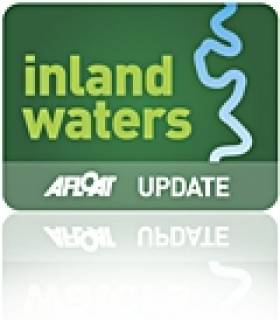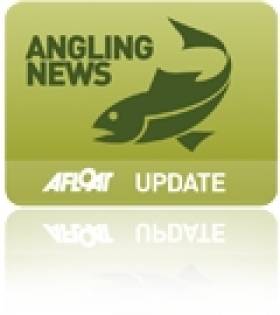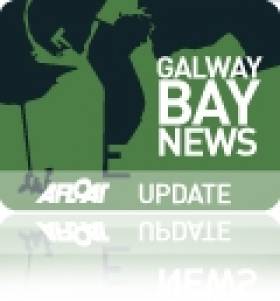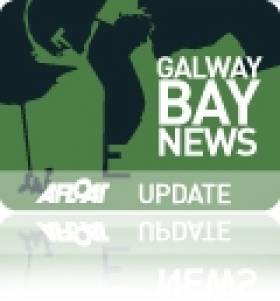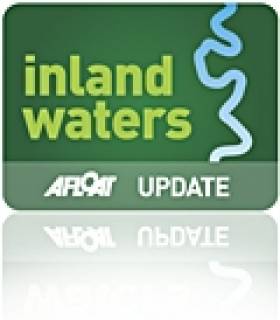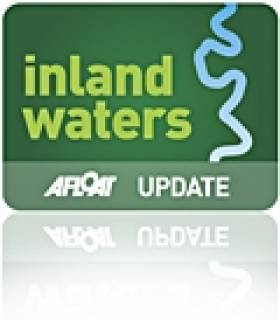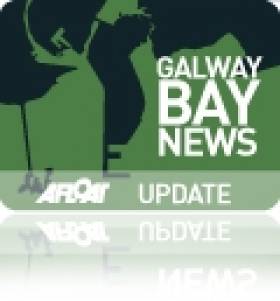Displaying items by tag: IFI
#FishFarm - The Galway Bay fish farm debate rolls on as Ireland's Marine Minister says there will be no damage to the environment or wild fish stocks.
Simon Coveney was speaking to Galway Bay FM last week on Bord Iascaigh Mhara's (BIM) proposals for a deep sea salmon farm off the Aran Islands.
The 500-hectare scheme would be the largest of its kind in Europe and has the potential to create hundreds of jobs in the region. A decision on BIM's licence application for the development is set to be made in the coming months.
But the plans have been opposed by conservationists, local anglers and the even the State fisheries body.
Last Wednesday 22 May, Inland Fisheries Ireland (IFI) published an FAQ on its concerns regarding the Galway Bay fish farm proposal, its own submission regarding the environmental impact statements attached to the licence application, and its reasons for avoiding a public debate on the issue.
"IFI is satisfied that its submission, which is supported by international scientific studies, clearly sets out its concerns and recommended measures for mitigation," it says.
Getting Kids Hooked On the Magic of Angling
#Angling - Ireland’s top mentalist - and passionate angler - Keith Barry is encouraging kids of all ages to get hooked on angling during Fisheries Awareness Week 2013.
Angling events for newcomers to the sport will continue at coastal and inland venues across the country till Sunday 19 May.
This is the fifth year of Fisheries Awareness Week, with 50 events in 16 counties dedicated to sea angling, pike angling, trout angling, coarse angling and salmon angling as well as family fun days, school days and more.
Minister Fergus O’Dowd heaped praise on Keith Barry for his involvement in the week. “It’s no surprise Keith loves angling as who could fail to be hypnotised by the magic of this absorbing activity?” he said.
“Keith has a real love of angling and a genuine interest in the outdoors. This passion really shines through when he is sharing is love of angling with the next generation.”
Fisheries Awareness Week aims to encourage youths and adults alike to take up the pastime of angling but also works with existing anglers to heighten their awareness of the environment.
The event is run by Inland Fisheries Ireland (IFI) in conjunction with fishing clubs, charter boat skippers and private fishery owners.
"Fisheries Awareness Week offers loads of opportunities for people, young and old, to get out on the water and go fishing," said IFI's Suzanne Campion. "Everyone from experts to complete novices are welcome but we hope that as a result of the week more people will take up angling as a pastime.”
Events are free and open to all, with family fun a priority. Check out events in your area by logging on to www.faw.ie.
#Angling - Inland Fisheries Ireland (IFI) has successfully prosecuted two men for taking more than the legal amount of coarse fish on Lough Derg.
Roman and Vytas Maslauskas, brothers originally from Lithuania but living in Ireland for the last eight years, appeared before Killaloe District Court where they were fined €500 each and were also disqualified from holding a driving licence for a period of six months. Both men have two weeks within which to lodge an appeal.
Last year IFI fisheries officers carried out a surveillance operation on the basis of reports received from both the public and local anglers on Lough Derg. The Maslauskas brothers, who were fishing mainly for perch from a boat, were doing so in manner that did not appear to be for recreational purposes. The anglers were capturing large numbers of fish using rod and line but had the aid of a fish finder on board the boat also.
The two men were apprehended at the lower end of the lake at the slipway in Ballina. Their boat and a large quantity of fishing equipment were seized during the capture. Some 32 perch were also seized, of which eight were over the 25cm size limit for coarse fish. Two vans were used in the operation for transporting the fish and equipment.
In his comments at the end of the case, Judge John Durkan said: “Our inland waters are of the most valuable in Europe and need to be well protected”.
He added that those who abuse them must face serious consequences.
“Protecting our fisheries is never an easy task,” said Minister Fergus O’Dowd, minister with responsibility for inland fisheries, at the outcome of the prosecution. “I commend the work of the Inland Fisheries Ireland staff, the Gardaí and of course the anglers and members of the public who made this prosecution possible.
“Working together you have helped the environment and the potential of Lough Derg to generate a better return economically and socially to the local community.”
IFI describes Lough Derg as “a mixed fishery which holds good stocks of coarse, pike and trout” and “a valuable natural asset to the local economy as it attracts both national and international anglers and visitors”.
IFI Limerick director Amanda Mooney commented that the ruling “sends out a strong message that our wild fish populations must be protected. IFI have invested in multi-lingual angling guides which detail and explain coarse fish by-laws. There is no longer an excuse of not knowing what rules apply.”
#InlandWaterways - Minister Fergus O'Dowd today (3 May) helped launch a new pilot scheme by Inland Fisheries Ireland (IFI) through which angling clubs and organisations can access funding to undertake sustainable development works in the Midland Fisheries Group permit area.
The Midland Fisheries Fund has an initial allocation of €50,000 which has been created from angler contributions set aside from the permit income received by IFI in the Midlands Fisheries Group area. The scheme, which is similar in design to the Salmon Conservation Fund, will allow for habitat improvement but importantly also includes angling development projects in Midlands waterways.
Successful applications will be provided with technical assistance to help them become reality and will foster links between the fishery owners, State agencies and land owners.
The application process itself, says IFI, "will instill confidence in project promoters who are often apprehensive due to the complicated nature of forms and permissions".
The scheme is exclusive to the Midland Fisheries Group area and is only open to clubs in that area.
Minister O'Dowd said at the launch: "This fund reaffirms IFI’s objective to facilitate stakeholders to undertake sustainable development works. These works will enhance and improve fisheries habitats and angling tourism potential and the contribution the inland fisheries resource makes to the economy."
The minister - who is currently undertaking a public consultation around the country in relation to the review of fisheries legislation - said he was encouraged by the angling stakeholders' enthusiasm, knowledge and interest in protecting, managing and developing the resource.
"This scheme encapsulates the partnership approach between IFI and its stakeholders, ensuring projects are environmentally sustainable, undertaken with the appropriate permissions and guidance and developed by local angling clubs for the benefit of locals and tourists alike," he said.
An information evening on the Midland Fisheries Fund will take place in Lough Owel Angling Centre on 14 May at 6.30pm.
Application forms for the fund are available online HERE. The closing date for receipt of application forms is 15 June 2013.
Meanwhile, the North South Ministerial Council (NSMC) has backed an initiative for the Loughs Agency to support the Carlingford Oyster Festival this August.
The Aquaculture and Marine sectoral meeting held in Carlingford this morning was attended by Minister for Natural Resources Pat Rabbitte, NI Minister for Rural Development Michelle O’Neill, Minister Fergus O’Dowd and NI Minister Nelson McCausland, who were all keen to endorse the proposals of the Loughs Agency to support the festival.
Taking place from 8-11 August, the festival has been developed by the Carlingford Cooley Tourism Association as a family-oriented event that showcases locally produced oysters and seafood. The agency will work in partnership with the local festival organisers on the annual event which attracts large numbers of visitors to the Carlingford area.
Minister O'Dowd said the festival “offers a real opportunity to showcase local produce and bring an international focus on Carlingford Lough as a production area of distinction for excellence seafood."
The ministers were also keen to emphasise that the tourism and visitor potential of the lough area should also benefit from a strong and vibrant oyster festival featuring as an attractive occasion on tourism and event calendars across the island and internationally.
#Angling - Minister Fergus O'Dowd launched Ireland’s first purpose-built disinfection station for angling enthusiasts at Ballyhoe Lake in Co Cavan on Wednesday 3 April.
The new facility - developed by Inland Fisheries Ireland (IFI) in co-operation with Interreg IVA (CIRB), the Irish Angling Development Alliance (IADA) and the local Meathhill Angling Club - will facilitate the disinfection of angling equipment on entry to the lake, helping to ensure that unwanted alien invasive species and harmful fish pathogens can be kept out of our natural fisheries.
Moreover, the development will also provide a template for further such facilities on fishery watercourses throughout the country.
The disinfection station is located at the entrance to Ballyhoe Lake, a prime Irish specimen tench fishery.
The entrance gate and the disinfection station are secured with combination locks, the numbers for which are available through nominated members of the Meathhill Angling Club (contact numbers for these members are provided on the tank). Members of the club will replace the disinfectant and manage the facility locally, as necessary.
Once opened, the tank contains a disinfection container for boots, keep nets, landing nets and stink bags. Disposable gloves are provided for angler use while disinfecting, and a brush is available to scrub boots, as well as a spray bottle for boats coming onto the lake.
Signage adjacent to and underneath the lid of the tank provides step-by-step instructions for the angler. Once the gear has been disinfected, the anglers apply a tag to his or her net to show that the process has been completed. Different colour tags will be utilised at the discretion of the operators.
Congratulating Meathhill Angling Club and the IADA at the launch, Minister O'Dowd said: "Angling clubs and federations the length and breadth of Ireland are key to the protection of our angling resources. By providing facilities such as this, we are adding to the goodwill and community commitment of Meathhill Angling Club to protect their fishery, while also ensuring access to it.
"This access helps to safeguard the sustainability of our valuable resource which will continue to bring much needed revenue to the local community through responsible angling activity."
The minister added that he "can’t emphasise enough the role anglers and clubs have on the frontline in the fight against invasive species, which supplements the great work in the area carried out by IFI with the support of representative bodies such as IADA."
Squabbling State Agencies Skip Fish Farm Debate
#FishFarm - The expected debate between two State agencies at loggerheads over the proposed Galway Bay deep-sea fish farm failed to take place as planned over the weekend as neither body sent a representative.
Bord Iascaigh Mhara (BIM) and Inland Fisheries Ireland (IFI) had been expected to debate the planned 500-hectare organic salmon farm off the Aran Islands during the Galway Food Festival over the Easter weekend.
Organisers were informed at the last minute that neither agency would be involved in the public event, with BIM telling The Irish Times it did not feel it would be appropriate to discuss the matter in an open forum when negotiations were ongoing.
Both sides have differed over the potential impact on wild salmon populations in the area, with IFI citing research that damns the negative consequences of sea lice infestations in fish farms.
Despite their absence, the debate went ahead as scheduled, with local businesses on both sides of the argument expressing their views.
The Irish Times has more on the story HERE.
TDs At Odds Over Galway Bay Fish Farm Plans
#FishFarm - Galway Bay FM reports that two West Galway TDs are at loggerheads over the proposed deep-water organic salmon farm for Galway Bay.
Eámon Ó Cuív of Fianna Fáil says Marine Minister Simon Coveney is showing inappropriate support for the aquaculture scheme proposed by Bord Iascaigh Mhara.
In response, Fine Gael deputy Seán Kyne reiterated the minister's own Dáil statement earlier this month that procedure would be followed 'to the letter' and that he could not take sides on the matter.
According to Galway Bay FM, the application for the 500-hectare fish farm, to be located off the Aran Islands, is still under consideration.
If greenlit, the facility would be the largest of its kind in Europe and would double the State's production rate of very profitable organic salmon.
But the plans have faced opposition from Inland Fisheries Ireland and local anglers, many of whom joined a 2,000-strong protest against the project in Galway city centre on 2 March.
IFI Completes New Cross-Border Angling Project in Leitrim
#InlandWaterways - Inland Fisheries Ireland (IFI) marked the completion of an angling development project under the Interreg IVA Cross Border Harnessing Natural Resources Programme in Co Leitrim today (Friday 22 March).
The IFI project incorporated the development of angling facilities at two locations - Acres Lake in Drumshanbo and Herons Shore on Lough Allen - with the aim of harnessing the nature-based tourism potential of the region and fostering cross-border economic development.
IFI upgraded existing car parks and added additional car parking spaces, angler access points, information signage and floating fishing stands.
Speaking at the ribbon cutting ceremony, IFI board chair Brendan O’Mahony said: "The essential investment in programmes such as this one ensures the long-term sustainability of angling amenities for Ireland. It increases visitor numbers which in turn provides job opportunities and revenue for local communities.
"It also raises the standard of the angling experience for all levels of angler and ensures that the resource is accessible for all to enjoy”.
O’Mahony also commended the commitment of the drivers of such projects and their vision.
Recognising that the phase completed by IFI is only one part of the overall programme, IFI director Amanda Mooney commented that the fisheries body was "delighted to be given the opportunity to be part of the overall Harnessing Natural Resources Programme" and wished success to partner agencies on their own projects.
Accidental Pollution Leads To Fish Kill In Co Kerry
#FishKill - Accidental pollution from a farm in Co Kerry has resulted in a fish kill on a tributary of the Ballyline River.
Inland Fisheries Ireland were contacted by Kerry County Council on Saturday 16 March after being altered by a farmer to a slurry spill on his property in the Kilgarvan area of Ballylongford.
Upon arriving at the farm, IFI officers found one side of the slurry pit wall had collapsed, resulting in a large slurry spill. Two cattle were also injured in the incident and had to be put down.
The slurry went into a watercourse that eventually flows into the Shannon Estuary at Ballylongford Bay.
The farmer had carried out emergency measures on site attempting to contain the slurry and also trying to minimise the impact to fish and wildlife downstream.
Fisheries officers carried out a visual inspection downstream but as the slurry was still passing there was strong discolouration and so it was impossible to see any dead fish. Samples were taken and sent for analysis immediately.
The situation was monitored over the weekend, and a full walkover of the stream was carried out as the water cleared on Tuesday 19 March.
IFI can confirm that a fish kill took place as a result of the pollution incident, and that 150 brown trout, hundreds of stickleback, one eel and one flounder were recovered. The section of river downstream from the farm to Gortanacooka Bridge was the most heavily impacted.
Currently there is a buildup of organic sediment in the river from the farm to the first bridge in Graffa Bog, which IFI says will not disperse until there is a flood in the river.
The farm was also inspected on the evening of 19 March and the water within the watercourse was clear. The investigation continues.
#FishFarm - The Government 'will follow procedure to the letter' regarding the proposed €100-million deep sea fish farm for Galway Bay.
That was the message from Marine Minister Simon Coveney in the Dáil last week, as reported by Galway Bay FM, after it emerged that more than 400 submissions on plans for the State's largest ever aquaculture scheme were made to the his department.
The Dáil discussions came just days after a public protest against the fish farm plans in Galway - and some months after the National Inland Fisheries Forum lambasted as "flawed" the consent process regarding the proposed development.
Some 2,000 people amassed in opposition to the 500-hectare organic salmon farm off the Aran Islands proposed by Bord Iascaigh Mhara (BIM), which if it gets the go-ahead would be the largest facility of its type in Europe and would double the State's production rate of organic salmon - one of Ireland's most profitable export foodstuffs.
BIM has previously accused environmental campaigners of being "deliberately alarmist" about the fish farm, despite concerns raised my Inland Fisheries Ireland over the potential impact of sea lice infestations on wild salmon in the bay.
Meanwhile, in a letter to the Galway Advertiser last week, Attymon resident Gabe Cronolly criticises a BIM leaflet informing the public of its proposals.
"The leaflet states that sea lice can only be held responsible for one per cent of salmon losses at sea, but fail to report that 39 per cent of mortalities in fish farms are attributed to sea lice," he writes.


























